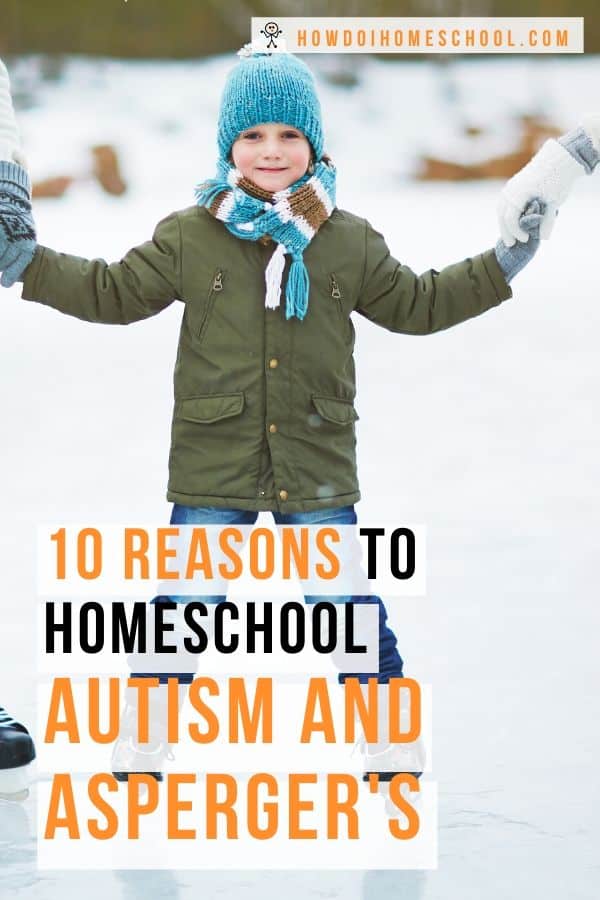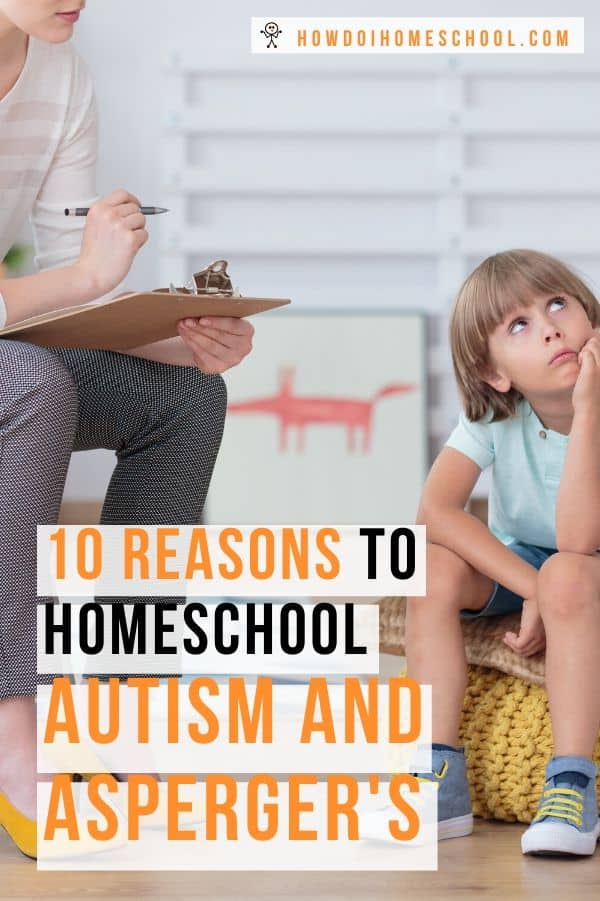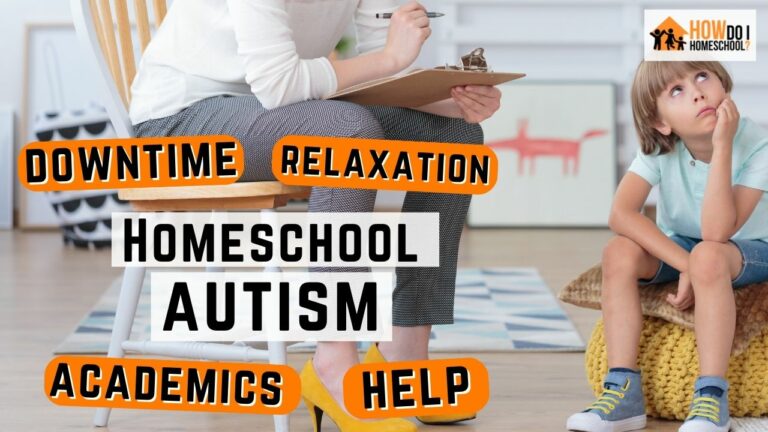With online education being more accessible than ever, many parents of autistic/Asperger children are considering taking the leap into homeschooling. And who can blame them? Home is where the heart is, and for many of these kids, it’s also where the headache-free education is. Say goodbye to school-related meltdowns and hello to the joys of homeschooling autism (and learning in your pajamas)!

I hope you enjoy reading this blog post. If you want to do my course on how to homeschool, click here.
There are many reasons already to homeschool neurotypical children, but there seems to be more reasons to homeschool a child with special needs such as ASD and Asperger’s.
In this article, we outline 10 reasons homeschooling autism or Asperger’s is a good idea, namely:
- Children learn more
- There’s less anxiety
- Increased predictability
- Increased concentration
- Less bullying or unfair reprimanding
- Uninterrupted lessons
- Fewer meltdowns
- More sleep
- Fewer headaches and stomach-aches
- Ability to veto stressful events
I’ve learned a fair bit about autism and Asperger’s from my independent educational study and more recently from a book called, Born on a Blue Day by Daniel Tammet.
(I wasn’t that keen on the book, but it did help me understand how a child with autism feels when going to school.)
The book, which is about an ‘autistic savant’ presents the difficulties faced by children with Asperger’s from the perspective of someone who has lived with ASD.
For this reason, I’ll quote from this book a little so we get an idea of what it is like to attend school from Daniel’s perspective.

Affiliate links used in this article.
Learn More When Homeschooling Autism
Children with autism (especially Asperger’s) will tend to learn more in a homeschool as they don’t have to spend as much time twiddling their thumbs if they finish before the rest of the class.
Some of these children find their lessons very simple and are asked to sit quietly and wait for the other students to catch up.
This means they waste valuable time they could have spent learning doing busywork or no work at all.
Daniel Tammet said this about his experience:
I always finished all my sums well ahead of the other children in the class. Over time, I had progressed literally textbooks ahead of everyone else. After finishing, I was asked to sit at my desk and to be quiet so as not to disturb the other while they did their work. Then I would pub my head in my hands and think about numbers. Sometimes, while absorbed in my thoughts, I would hum softly to myself without realizing I was doing so until the teacher came up to my desk, when I would realize and stop. Born on a Blue Day, p. 69.
Children feel safe and calm at home.
Given learning is always best in this type of environment, the home environment naturally recommends itself as a suitable and safe learning space.
Learning Social Skills
Children with Asperger’s want to make friends, but find it very difficult.
If they don’t have friends, they can feel isolated at school, giving them feelings of deep pain.
These children can find friends in the home environment.
They can learn social skills by socializing in homeschool groups and other forums.
The great thing about groups like these is that children have their parents around so they feel more secure.
Parents are also able to intercept situations when they’re getting out of control and teach their children with autism how to navigate tricky social situations.
Less Anxiety When Homeschooling Autism
Children with autism have a higher incidence of becoming anxious in the school environment due to many factors.
School can make many children with autism feel like they are ‘loners’ and different from the rest of their classmates.
This can cause adverse effects, one of which is increased anxiety.
Daniel Tammet said this about his anxiety levels in school:
Feelings of anxiety were common for me throughout my time at school. I became upset if a school event was announced at short notice in which everyone was expected to take part, or by changes to the normal routines of the class. Predictability was important to me, a way of feeling in control in a given situation, a way of keeping feelings of anxiety at bay, at least temporarily. I was never comfortable at school and rarely felt happy, except when left alone to do my own thing. Born on a Blue Day, p. 67.
Homeschooling autism or Asperger’s children creates a happier environment in which children can relax and feel like they belong.
Instead of dwelling on their differences, parents can focus on their accomplishments and talents, teaching them using a more suitable curriculum as opposed to that prescribed for every student.
At home, children also readily find friends in their parents and siblings, meaning they don’t have to spend large swathes of their days alone and friendless at school.
Increased Predictability
One of the factors that typify a student with ASD is their dislike of spontaneity and their reliance on the predictability of events in their life.
Losing predictability in their lives can lead to more distraction, less concentration, and ultimately less work.
When frustrated like this, children with ASD can become angry and upset.
Daniel Tammet said, ‘I hated being away from home because everything was mixed up and I find it hard to cope with change.’
Home offers a more controlled environment with higher levels of predictability.
Children feel safe and calm in this space, and, therefore, tend to learn more.
Daniel said, ‘It was always good to be home. It was where I felt safe and calm.’
Increased Concentration When Homeschooling Autism
Children with autism or Asperger’s find it difficult to concentrate on their lessons when there is so much happening in the classroom.
They continually lose focus and are frustrated in their attempt to ‘join the dots’ as they can’t focus.
Homeschooling provides them with a quiet environment with limited distractions, increasing their concentration levels and allowing them to take in more information and do more work.
Less Bullying or Unfair Reprimanding
Many children with autism get bullied for habitual behaviours they can’t help exhibiting.
Some hum to themselves or tap their pens.
This may be irritating to peers or teachers and result in bullying by the former and unfair reprimanding by the latter. Daniel said this about bullying in his school:
Bullying was sometimes a problem for me because I was different and a loner. Some of the children would call me names or tease me for not having any friends. Fortunately, they would always get bored and walk away because I wouldn’t fight with them. Such experiences reinforced the perception that I was an outsider and did not belong. Born on a Blue Day, p. 71.
Sometimes children with autism don’t even know they’re doing this, so it seems very unfair to be bullied or reprimanded for these actions.
Because children with autism don’t always pick up on social cues, their unresponsiveness may be mistaken for failure to participate and bring on a strong reprimand by teachers. This was Daniel’s experience:
I would get into trouble in class if a teacher thought I was being unresponsive, when in fact I had not realized they were expecting me to give an answer. For example, [the teacher] would say: ‘Seven times nine’ while looking at me, and of course, I knew the answer was 63 but I did not realize I was expected to say the answer out loud to the class. It was only when the teacher repeated his question explicitly as: ‘What is seven times nine?’ that I gave the answer. Knowing when someone expects you to reply to a statement is just not intuitive for me, and my ability to do things like converse socially has only emerged as the result of lots of practice. Born on a Blue Day, pp. 76-77.
Home education allows children with autism to socialize with those who understand them better.
Parents understand their children with autism more and know what is and is not deliberate misbehavior from them – something teachers sometimes mistake.
Uninterrupted Lessons When Homeschooling Autism
Many traditional schools move from subject to subject continually as they progress through the curriculum at a one-size-fits-all pace.
This pace doesn’t suit all students, least of all many children with autism.
They may find the pace of some subjects are too slow (for example, if they’re gifted), while others are too quick.
This pace increases as children progress from primary to secondary education.
In high school, students often have to move to different classrooms every hour as they change subjects.
They change teachers and may need to find their way to a new classroom every hour.
This can be disorientating and distressing for some, making it the hardest part of their school education.
Daniel Tammet said this about his experience transitioning from primary to secondary education:
Moving from one hour to the next, from subject to subject, classroom to classroom and teacher to teacher was one of the hardest things for me to adapt to in the transition from primary to secondary education. Born on a Blue Day, p. 98.
By contrast, homeschooling children with autism lets them focus on the task that has their attention for as long as they wish without changing activities.
This means they have more satisfaction as they will finish lessons more often and feel a greater sense of satisfaction.
Fewer Meltdowns
Being away from home means everything is mixed up, and children with autism find it hard to cope and adjust to the amount of change expected of them.
Meltdowns are common, especially in primary school, as children with autism and Asperger’s regularly feel their world spiralling out of control.
Homeschooling children with autism means you’ll have a reduced incidence of meltdowns as children are less anxious and stressed as they might be in the school environment.
Exams are also less stressful in the home environment, and often you can veto them completely with testing tools like narration.
Less Head Banging and other Destructive Actions
When children with autism become extremely stressed, they may engage in destructive behaviors that calm them.
Some bang themselves violently against the wall, even until their head bleeds.
This sends endorphins into the brain and somewhat numbs the anxiety-causing hormones.
It can be quite scary for some parents.
Homeschooling provides a calmer environment, so these behaviors are less common.
More Sleep
Sleep is a big predictor of productivity.
If you don’t get sleep, your production decreases.
Children with ASD may become more irritable and have more meltdowns when sleep-deprived.
Unfortunately, the structure of many schools means children cannot get enough sleep.
This is particularly true for teenagers who often need more sleep in the morning but have to wake up early to get to school on time.
Some are walking around with permanent sleep debts due to the chronic lack of sleep.
This issue is resolved if study is conducted at home as students don’t have to start lessons at a set time every day.
Homeschooled children with autism or Asperger’s can sleep in until they’re fully rested and start lessons afresh, helping them to learn and avoid meltdowns.
Fewer Headaches and Stomach Aches
Vomiting, diarrhoea, headaches, and stomach aches are symptoms of school-phobia.
They come from the heightened feelings of anxiety produced by a fear of going to school.
These, and other somatic symptoms, are not unusual in children with autism attending school as they often find the whole system and process of attending an educational institution exhausting and anxiety-provoking.
Daniel Tammet had these symptoms. He recounted his school days saying:
Feelings of anxiety were common for me throughout my time at school…headaches and stomachaches were frequent signals of how tense I was during this time. Sometimes it got so bad that I didn’t even make it into class at all, for example, if I arrived a few minutes late and realized class had gone to assembly. I was terrified of the idea of walking into the hall by myself and didn’t want to wait for all the crowds and noise of the children walking back out together afterwards, so I walked straight back home to my room. Born on a Blue Day, p. 67.
Ability to Veto Stressful Events
Because children with autism tend to focus on details more than on the big picture, they can find team sports or team events difficult and unpredictable.
They may feel further alienated when they’re continually the last to be chosen in different events, such as on a sporting team.
This may make them particularly dread sports, carnivals, or other social days at school.
Homeschooling means parents can patiently teach children the skills they need in these areas and wisely veto activities that are not worth doing or may cause meltdowns.

Homeschool Autism Curriculum
Not all homeschool curriculum programs will be suitable for children with autism.
I’ve asked parents on homeschool groups what homeschool curriculum they’d use for autism and they gave me their 10 best homeschool curriculum for autism options.
Check them out.
Is Homeschooling Better for ASD
Homeschooling is a much better environment than school for educating children with ASD.
Home is a quieter place.
There’s less pressure to socialize when children are feeling overwhelmed.
Parents can control the environment more and spend more time teaching children to control themselves.
Parents also have a greater knowledge and love of their students, leading to better academic outcomes and a happier schooling experience.
These reasons and more are why homeschooling has become a popular choice for children with ASD.
Subscribe to How to Homeschool (my Youtube channel!)
Have you caught the homeschooling bug?
Eager to delve deeper into the realm of unconventional education?
Firstly, hop on over to my YouTube channel, where a treasure trove of homeschooling wisdom awaits. From practical tips to delightful anecdotes, I unravel the mysteries of homeschooling with a touch of wit and wisdom.
Subscribe, hit that notification bell, and embark on an enlightening journey with me.
Enroll in the Homeschool Parenting Program
Secondly, for those yearning for a comprehensive guide to homeschooling, look no further than my Homeschool Parenting Program.
This illustrious online course will equip you with the knowledge, strategies, and confidence to navigate the exhilarating world of homeschooling like a seasoned pro.
Enroll today and unlock the door to extraordinary educational possibilities.
Homeschooling Autism is Best
Homeschooling helps children feel accepted and loved, freeing them to work on their lessons easily and concentrate, which is hard to attain in the school environment. Whereas school offers a scary environment full of change, the home offers a safe and predictable environment to work. Children can work on their behaviors at home and gradually and gently learn social skills through other and more gentle forums than school provides.



